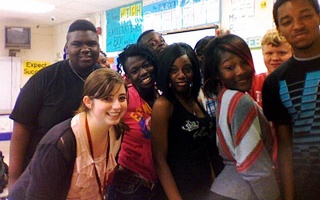
Rema Nagarajan, journalist with the Times of India, speaks about continuing poverty in India despite economic growth over the last decade.
Harvard University Students Taking On Poverty (STOP) hosted a joint lecture entitled “Bridging the Gap” at the Science Center on Saturday, featuring 11 guest speakers who shared their views on pressing poverty-related subjects.
“Our goal is informing the public about issues in poverty that they might be blind to,” said Marjorie LaCombe ’13, president of STOP. Each speaker had approximately 10 minutes to present, with the ultimate goal of giving attendees a well-rounded view of some critical aspects of poverty all over the world.
The subject material and style of presentation was extremely diverse: professors, journalists, and poets all had something to contribute. The first speaker was Harvard Professor of Philosophy and Human Rights Mathias Risse, who discussed the inherent injustices in the free market that he said help perpetuate poverty. He argued that helping to alleviate poverty was more a matter of correcting systemic inequality than relying on individual charity.
“Helping the poor is a matter of justice, not a matter of beneficence,” said Risse.
Next up was Rema Nagarajan, a journalist for The Times of India, the widest-read English newspaper in India. Nagarajan delivered a forceful speech, arguing that despite India’s rapidly rising GDP, the majority of Indian citizens were being left behind.
“Sixty percent of people earn about two dollars a day,” she said.
Anna Griffin, a reporter at The Oregonian, told the audience about Portland’s successes combatting poverty through urban planning.
Shining a more aesthetic light on the darkness of poverty, Harvard undergraduates Samantha A. Berstler ’14, and Ekene I. Obi-Okoye ’12 recited their own original poetry on the issue.
Amanda Fernandez, who represented Teach for America, also spoke at the event, advocating the importance of education in combating poverty.
From a more vocational point of view, Yvette Castro talked about Fashion Fights Poverty, a group that looks to help the poor through artisanal training and socially conscious consumerism.
Rounding out the evening were Elizabeth Toulan, senior attorney at Greater Boston Legal Services, and Katharin Dyer, a board member of CARE USA, who talked about how poverty can be combated via legal representation and humanitarian support, respectively.
The final presentation was given by 13-year-old Tajonna, whose last name was omitted from the program, and her chaperone, Samantha Wolfe, representing the Massachusetts Face of Homelessness Speakers’ Bureau. Tajonna told the story of her time living on the streets.
Themes such as education, economic support, and humanitarianism pervaded the night. But many of the speakers made special reference to Harvard, and the significant changes that students at the College can affect with regards to poverty.
Despite the array of accomplished speakers at the event, it attracted about 50 people, leaving many of the seats in the Science Center empty.
Read more in News
OCS Hosts Advertising, Marketing, and Public Relations Job ExpoRecommended Articles
-
 Tornado-Swept
Tornado-Swept -
Show Me the MoneyIn addition to offering financial services, microfinance will never empower individuals past the level of sustainability and promote entrepreneurship if the industry doesn’t start giving out at least slightly larger loans.
-
How About More People?The majority of world population growth comes from the increased life expectancy of the world population, yet population control advocates do not support the end of medical research or medicine.
-
When Fair Is FoulOccupy Harvard sees “injustice in Harvard’s adoption of corporate efficiency measures such as job outsourcing.” And yet, simultaneously, we have this statement, from Occupy Wall Street: “Ending wealth inequality is our one demand.” An incongruity because it begs the question—whose wealth inequality?
-
Philanthropy Takes Many Forms, Panel SaysWhen people think of philanthropy, often large monetary donations from J.P. Rockefeller and Andrew Carnegie come to mind. But philanthropy can include everything from the promotion of American art to support for education, said panelists at the John F. Kennedy Jr. Forum at the Institute of Politics on Thursday.
-
The Bell of HopeThere simply wasn’t enough discussion about poverty or our overcrowded prisons in the last election cycle. Solving both problems begins with putting these issues at the forefront of our political discourse.













